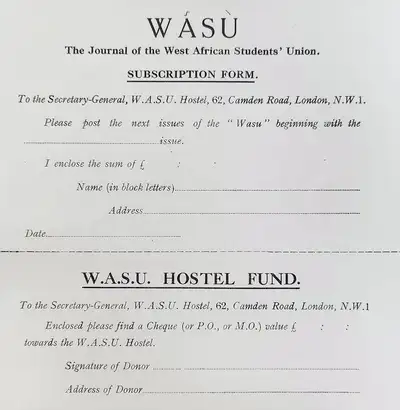Record revealed
The WÃSÙ journal
WÃSÙ was the journal produced by the West African Students’ Union (WASU) and distributed across Europe and Africa from 1926. Active in Britain between the 1920s and 1960s, the Union became the ‘home from home’ for West Africans in London during the 20th century.
Images
Image 1 of 6

'With WASU’s Compliments' ... This front cover and contents page of WÃSÙ, from January 1933, shows what was inside a typical issue.
Transcript
Vol. II. – No1.
January, 1933
WÃSÙ (Preach)
The Journal of the West African Student's Union of Great Britain.
CONTENTS.
Editorial – 1
The president's letter – 3
W.A.S.U. Hostel – 4
W.A.S.U. oration, by Rev. M. S. Cole, M. A. – 7
A short pen picture of Mr. Herbert Macaulay, C. E. – 10
W.A.S.U. branches – 12
W.A.S.U. oration, by Rev. I. O. Ransome Kuti, B. A. L. Th. – 7
Hon. Ogboni Agbda Dr. J. Akanni Doherty – 18
News and notes – 21
What the Gold Coast people said recently about the W.A.S.U. hostel scheme – 24
Exhortation to W.A.S.U. and its members, Rev. S. O. Odutola, B.A., D.Th. – 25
Yoruba constitutional law, by Ladipo Solanke – 28
Trade and industry – 39
Book review – 40
Copes may be obtained from the Secretary-General, W.A.S.U.,
W.A.S.U. Hostel, 62, Camden Road, London, N.W.1
Image 2 of 6

The journal contained adverts like this for Elder Dempster Lines, the major shipping line that served West Africa. The WÃSÙ calendar is also advertised.
Image 3 of 6

The first hostel for African students and visitors opened by WASU on Camden Road, NW1, in 1933. There were 18 rooms, as well as outdoor and common spaces.
Image 4 of 6

The journal and hostel were dependent on funding from the Union’s members as well as external donations.
Image 5 of 6

WASU also benefitted from patriots in West Africa such as Prempeh 1, the thirteenth King ruler of the Ashanti Empire and the Oyoko Abohyen Dynasty, who died in 1931.
Image 6 of 6

A letter accompanying the January 1933 edition of the journal, sent to the Secretary of State for the Colonies, Philip Cunliffe-Lister. The deferential language, 'British West African children' positions WASU members as young wards of the British Empire, reliant on the benevolence of the colonial government.
Partial transcript
We are anxious that the Secretary of State will so sympathetically interest himself in this our poor initiative movement in the matter as to be willing and ready to give us a necessary lift whenever we, as his British West African children, may approach him for such aid.
Why this record matters
- Date
- January 1933
- Catalogue reference
- CO 323/1243/7
The West African Students’ Union (WASU) operated from August 1925, and remained active until the 1960s. Founded by West African law students Ladipo Solanke and Herbert R. Bankole-Bright, WASU was a political organisation that served African students studying mostly in London.
The organisation assisted students with accommodation, shared news and became a place for political discussion, becoming a significant voice on the end of colonial rule in Africa, Pan-Africanism, and anti-racism in Britain. WASU’s members, such as the future Prime Minister of Ghana Kwame Nkrumah and Kenya’s first president Jomo Kenyatta, would shape independence movements across African countries in the following years.
We hold four copies of WÃSÙ – the journal that the Union first published in March 1926. The journal’s name, which also meant ‘preach’, is derived from Yoruba, one of the languages of Nigeria. Released monthly, the journal cost one shilling in 1933, about £3 today. The journal was distributed internationally and connected branches of WASU in Africa, although these groups operated only for a short time.
The pictured edition from January 1933 was sent to the Secretary of State for the Colonies, Philip Cunliffe-Lister, Conservative MP for Hendon, along with a letter. The Union hoped the Secretary might support them financially as they launched the African Student’s Hostel in Camden Road, London. The colour bar made it difficult for West African students to secure lodgings in London, but the hostel provided cheap accommodation, and a place for West Africans to gather. It even had its own restaurant, serving food shipped from the continent.
Despite the letter, due to WASU’s political priorities the government were reluctant to financially support the hostel. They preferred to direct funds towards the government-administered Aggrey House in Doughty Street, King’s Cross, whose staff included Ivor Cummings. In March 1934, WASU published a pamphlet in protest of Aggrey House and a boycott followed. In 1938 WASU opened a second hostel in the more exclusive Camden Square.
Through the journal, the Union appealed to their members for donations, shared news, such as the graduation of West African students, and announced events. The journal also contained essays written by members covering a range of subjects such as Yoruba customs. The editor also made note of generous donations, like that of Paul Robeson the American singer, sportsman, and activist, who made several contributions.
From the journals, and the files in our collection that contain them, we can see some of priorities of the Union, providing a vivid picture of this historic organisation, and the lives of young West Africans in Britain in the early 20th century.
